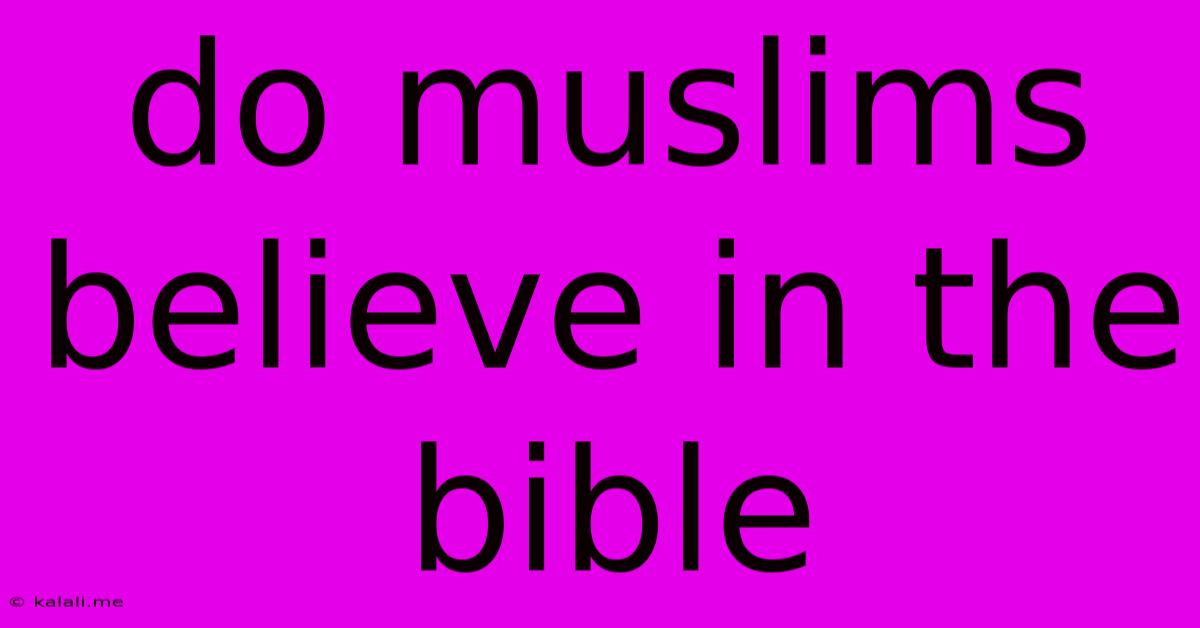Do Muslims Believe In The Bible
Kalali
Jun 09, 2025 · 3 min read

Table of Contents
Do Muslims Believe in the Bible? Understanding the Muslim Perspective on the Bible
The relationship between Islam and the Bible is a complex one, often misunderstood. While Muslims don't consider the Bible the final or divinely revealed word of God in the same way Christians do, they hold a deep respect for it. This article will explore the Muslim perspective on the Bible, clarifying common misconceptions and highlighting the role it plays within their faith.
The Quran's View on Previous Scriptures: The Quran, the central religious text of Islam, explicitly acknowledges previous divinely revealed scriptures, including the Torah (given to Moses) and the Injeel (Gospel, referring to the teachings of Jesus). It emphasizes that these scriptures were originally revealed by God, but over time, alterations and corruptions occurred. This belief is crucial to understanding the Muslim view of the Bible. Muslims believe that the original, uncorrupted scriptures contained God's message, but that the current versions are not entirely accurate.
Respect for the Prophets: Muslims revere Jesus (Isa) as a prophet of God, albeit not the son of God as depicted in Christian theology. They respect his message of peace, love, and devotion to God. Similarly, they hold Moses (Musa) and other prophets mentioned in the Bible in high regard. This reverence extends to the scriptures these prophets received, even if Muslims believe they have been altered or misinterpreted over centuries.
The Bible as a Source of Historical and Spiritual Insight: Despite the belief in corruption, many Muslims still find value in studying the Bible. They view it as a source of historical context for understanding the lives of the prophets and the evolution of religious thought. Some Muslims study the Bible to better understand Christianity and foster interfaith dialogue. This scholarly approach focuses on identifying commonalities and shared values between the two faiths.
Differences in Theological Interpretations: The key difference lies in the theological interpretations. While Christians believe Jesus is the Son of God and part of the Holy Trinity, Muslims believe in the absolute oneness of God (Tawhid), rejecting the concept of the Trinity. The concept of Jesus' crucifixion is also interpreted differently. Muslims believe that God prevented Jesus' actual crucifixion and raised him directly to heaven.
Emphasis on the Quran as the Final Revelation: The core of the Muslim belief system revolves around the Quran, which Muslims believe to be the final and complete revelation of God's word, preserved in its original form. The Quran is considered the ultimate authority, superseding all previous scriptures. This doesn't negate the importance of the Bible for Muslims but establishes the Quran as the primary source of guidance and understanding.
In Summary: Muslims do not believe in the Bible in the same way Christians do. They recognize the Bible as a previous divine scripture but believe that it has been altered over time. They respect the prophets mentioned in the Bible, including Jesus, and find value in studying it for historical and spiritual insight. However, their faith centers on the Quran as the final and complete revelation of God's word. Understanding this distinction is crucial for fostering respectful interfaith dialogue and appreciating the diversity of religious beliefs.
Latest Posts
Latest Posts
-
Can I Take My Xbox On A Plane
Jun 09, 2025
-
How To Install A Dishwasher With A Granite Countertop
Jun 09, 2025
-
How To Install Recessed Lighting In Existing Ceiling
Jun 09, 2025
-
Inscryption Im Stuck In A Dark Cabin
Jun 09, 2025
-
Do Not Forsake The Assembly Of The Saints
Jun 09, 2025
Related Post
Thank you for visiting our website which covers about Do Muslims Believe In The Bible . We hope the information provided has been useful to you. Feel free to contact us if you have any questions or need further assistance. See you next time and don't miss to bookmark.